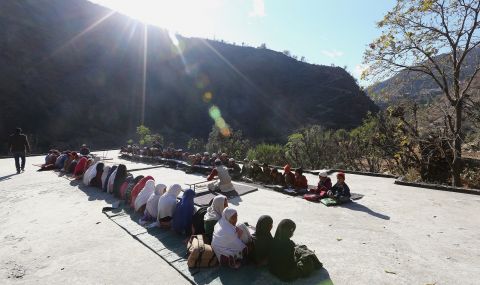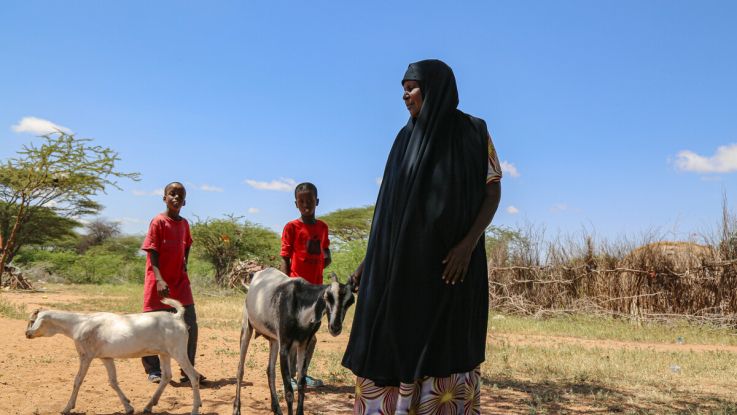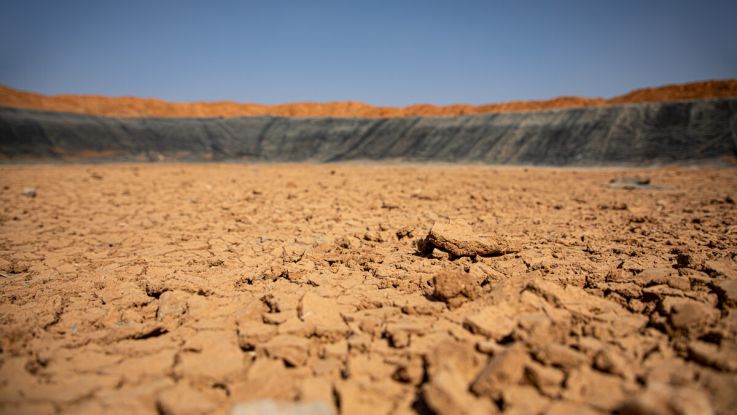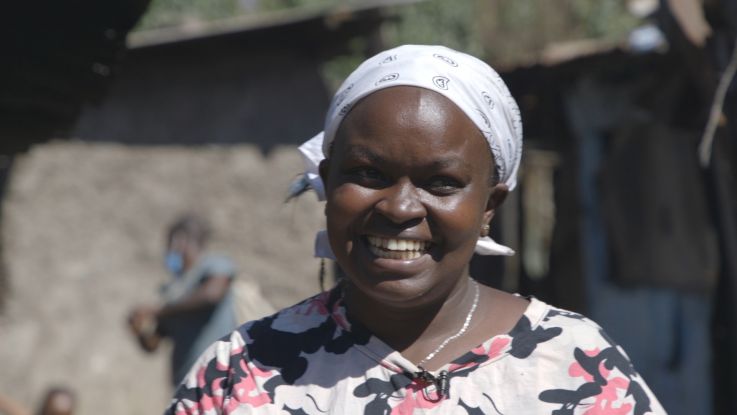How are Muslims observing Ramadan during the coronavirus crisis?
7 May 2020
Ramadan during the coronavirus pandemic is looking very different for Muslims around the world, and those with very little to begin with will suffer the most.
Find out how our trustee Abdul Shiil is practising his faith during this holy month and how those of us who observe Ramadan can help this month and after.

Muslim children of Gujjar community reads Quran at Maswari madarsa in India. Photo: Raul Irani Kirmani/ActionAid
Ramadan this year will be different for Muslims around the world. From Senegal to Southeast Asia, the global Muslim community - about 1.8 billion people - has been facing an extraordinary start to the holy month of Ramadan.
For Muslims, it is a time for collective worship, deep contemplation, and increased charity - whether volunteering our time or through giving donations to those in need.
But as the world goes under lockdown during the coronavirus crisis, the communal aspects of Ramadan this year will be missed: mosques have closed, bans or curfews have been imposed on mass prayers and gatherings, and we can no longer break our fasts with wider community members, friends and relatives.
What is Ramadan and what it means to me
Ramadan is regarded as the holiest month in the Muslim calendar. It is the month, when the Holy Quran was revealed to us and when Muslims fast from dawn to dusk (one of the five pillars of Islam), as a form of submission to get closer to God spiritually (Taqwa).
“O you who believe, fasting has been prescribed for you as it has been prescribed for people before you so that you attain Taqwa.” (2:183).
To me, Ramadan is an opportunity to increase my worship through prayer and through reading the Holy Quran. It is a time of reflection, a time in which I set my yearly targets from both a personal and a professional perspective.
What does Ramadan during a coronavirus crisis look like for Muslims around the world?
Dedicated to family and community reunions, meditation, love, charity and prayer, this year’s holiest month in the Islamic calendar is sure to be more notable.
Ramadan is when people meet up and attend joint prayer rituals and break their fast together at mosques and community centres.
But beyond the observance of religious precepts, Ramadan is also a period distinguished by sharing kindness and camaraderie through social interactions. It is known for the strengthening of community bonds between Muslims and for engaging in massive charitable acts.
For example, public iftars – the breaking of the daily fast with others in mosques – play an important role in collective solidarity and alleviating the burdens suffered by those most deprived during this month.

Large gatherings to pray or read the Quran like this in a madrasa in India, are not allowed during the Covid-19 pandemic.
This year, however, the World Health Organisation has called for preventing large numbers of people from meeting in places associated with Ramadan to limit the spread of the virus1 . Similarly, the advice issued by the Muslim Council of Britain states that there will be no prayers in the congregation, no Tarawih in the mosque, and no Iftar gatherings2 .
While many families now find themselves observing their fasts and prayers in this new setting, Ramadan brings more difficulties for Muslims who live in poverty.
Many people around the world, in particular those living in temporary shelters or refugee camps, those struggling with conflict or war, and those contending with humanitarian crises - won't know where their next meal is going to come from. For them - the fast doesn't end at dusk, it continues into the night and possibly without end.
Anxiety brews in Rohingya refugee camps as Ramadan goes on and due to lockdown in Bangladesh, relief can’t easily reach the camps.
Syrian refugees in Jordan, who are already struggling with the emotional and physical hardships from a civil war, are now facing Ramadan during the Covid-19 pandemic and their lives may become even more arduous.
Somaliland, the country of my heritage, has seen the worst outbreak of locusts in decades, after an extreme year that was marked with floods and droughts. I have heard about stories where farmers have lost their entire crop and cattle. That along with the coronavirus crisis may lead to a massive economical and emotional upheaval which will, unfortunately, hit those in need, the hardest during this month and after.
How can Muslims help this Ramadan?
As events are cancelled, flights are grounded, and people are adapting to new living and working situations, charities are struggling to ensure those in most need get the help they require.
During this exceptional Ramadan, Muslims can make the most impact by supporting charities that work with the most vulnerable members of our society, all around the world.
We are encouraged to continue our act of giving and goodwill by donating as part of our Sadaqah Jariyah.
It can be as simple as supporting ActionAid by donating £5 a month to provide hygiene kits with soap and sanitary towels, or giving £10 a month to provide food supplies like rice, oil and lentils to those who need it most.
As we know, every good deed performed during Ramadan is multiplied several times in the eyes of God.

Senoara, 18, is a Rohingya Muslim who fled the violence in Myanmar at the end of 2017.
The Prophet Muhamad (P.B.U.H) said:
Charity obliterates sins just as water extinguishes fire."
Even as your other Ramadan rituals change this year, you can still help by donating to charity. Your contributions are needed now more than ever, to ensure that the most vulnerable are not just protected in the short term during the month of Ramadan, but that they are assisted on an ongoing basis to rebuild their lives long after this crisis is over.
This is how the Sadaqah Jariyah benefits both the receiver and giver, for years to come.
Why ActionAid?
Many of ActionAid’s supporters recognise and observe the month of Ramadan and have cited their faith as the basis of their giving in the past.
In this special month of the Islamic calendar, ActionAid is offering an opportunity to those supporters who would like to make a donation to fulfil their religious wishes or obligations.
The role of Ramadan is undeniable in showing what co-operation, empathy, and respect for one another other can do in building bonds of friendship, equality and unity in the Muslim world.
The combined charity of those observing the month of Ramadan can help save lives of many vulnerable people during this global disaster and shield them from the unbearable misery of hunger and thirst.
It is what incredible charities such as ActionAid – who already have a proven track record in working with the most vulnerable of communities – have been doing for many years, with great success.
Not only do they provide immediate, humanitarian aid but they also stay back and work together with communities to provide long-term, sustainable solutions.
This is why I proudly support ActionAid and their thoughtful fundraiser in the month of Ramadan and hope that you do the right thing by supporting their Ramadan Appeal where your donations will go a long way, in trusted hands, and will help those most in need.
To this end, I wish you and your family a safe and blessed month of Ramadan.
Ramadan Kareem.
How you can help
Start your Sadaqah Jariyah this Ramadan and help us provide year-round support to families and children in crisis.
Together we can provide life-saving aid and sustainable support to those who need it most.



